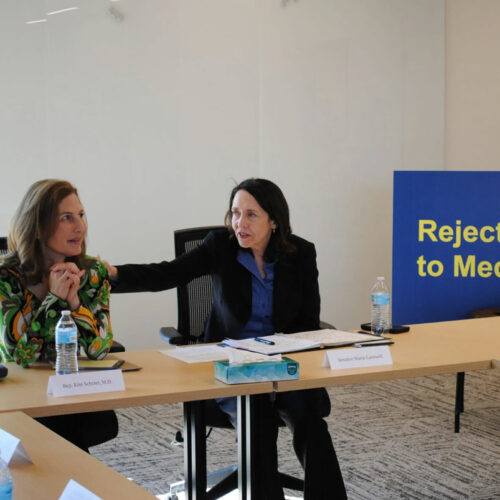
Judge Orders Injunction On Abortion Ban As Physicians Urge Law’s Revision
Listen
(Runtime 0:56)
Read
A federal judge has blocked part of Idaho’s near-total abortion ban that took effect Thursday. The injunction will prevent attorneys from prosecuting doctors who cannot prove they performed an abortion in order to save the life of the mother.
The decision comes shortly after more than 300 Idaho physicians signed a letter urging the revision of Idaho’s ban earlier this month.
Judge B. Lynn Winmill in Boise issued a preliminary injunction Wednesday, saying the law did not provide adequate legal protection to physicians performing abortions in emergency care, and would violate the Emergency Medical Treatment and Labor Act, known as EMTALA.
That decision is likely to be appealed by the state, but will, for the time being, allow doctors to perform abortions with less fear of criminal charges. The outcome in Idaho could also affect how similar bans being considered in other states are worded.
That lack of legal protection is one of the largest issues doctors in the Idaho Coalition for Safe Reproductive Health Care cited in their letter.
“The Total Abortion Ban outlaws the abortion of any type of ‘clinically diagnosable pregnancies’ without any exception for serious, life-threatening pregnancy complications. Uncertainty about the risk of criminal charges for providing evidence-based care during such a complication could result in catastrophic outcomes.”
The coalition’s letter, signed by one Lewiston-based OBGYN and two Moscow doctors, characterized the law as it is currently written as “dangerously vague and excessively restrictive.”
The coalition cited birth complications including ectopic pregnancy and early incomplete miscarriage, along with other complications and conditions such as pre-viable preeclampsia or heart failure that would require immediate emergency care.
“With no option but to continue the pregnancy, patients with these conditions face an unacceptably high risk of death or permanent disability,” the letter stated. “As health care providers we guide patients and their families with the best scientific evidence available, we consult with their spiritual leaders, but ultimately the decision of who lives and who dies is the sole decision of the patient; not us, and most certainly not the lawmakers.”
The letter continues to state that the law fails to make exceptions in the case of lethal or severely life-limiting diagnosis of a fetus such as anencephaly, where the major portions of the brain, skull or scalp fail to develop properly.
“Continuing this pregnancy increases the risk of major maternal complications, while also further delaying the ability to conceive a healthy pregnancy,” the letter stated.
The letter asked Idaho citizens to contact representatives to recommend revisions to the law “to protect the women of our state from reproductive harm.”
This report is made possible by the Lewis-Clark Valley Healthcare Foundation in partnership with Northwest Public Broadcasting, the Lewiston Tribune and the Moscow-Pullman Daily News.















